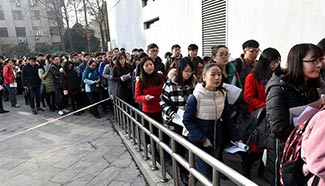TAIYUAN, Nov. 24 (Xinhua) -- Yan Xingfeng, a student at north China's Shanxi Agricultural University, has turned his back on education, for the time being.
Instead of juggling his startup business idea with his senior-year studies, Yan turned to a different choice.
"I'm going to take a gap year so I can fully devote myself to making a go of my business," he said.
In September, the provincial government released a plan on innovation and entrepreneurship in college, which allows students to take a gap year to explore their business ideas.
Students can earn credits if they successfully start a business, register a patent or publish a paper during their gap year.
"Many universities are mulling measures like this. A systematic and official plan to deepen reform is just what they need," said Zhang Cunwei, head of higher education at the provincial education department.
"The new measures offer students the opportunity to really understand their market, discover -- and solve -- real problems, and make sure they have identified the right area to start a business," he said. "We also hope to nurture talented individuals, helping them to become the candidates companies need -- as not all will succeed and many will still need to find a job after graduation."
Ma Hongjun, a first-year postgraduate student, started to grow cherry tomatoes when he was just a freshman at Shanxi Agricultural University.
According to Ma, taking a gap year provides more options for startups."My business is closely related to my degree, so I can balance my business and studies. But for those who cannot handle the two at the same time, a gap year would be a blessing."
Following a failed attempt, Ma now leads a team that supports the business endeavor by growing quality vegetables. They even provide lessons to pre-schoolers and primary school students.
In May last year, the State Council, China's cabinet, posted guidelines on an innovation and entrepreneurship education system at the college and university level, with the aim to improve the quality of talent and encourage more college students to start their own businesses by 2020.
Many provinces and municipalities across China have come up with their own plans to carry out the reform.
"Entrepreneurial success is, after all, a small probability event. But success is never our only goal," said Xiong Bingqi, deputy dean of the 21st Century Education Research Institute. "Most startups learn and thrive from failures, which is the essence of our entrepreneurship education."










